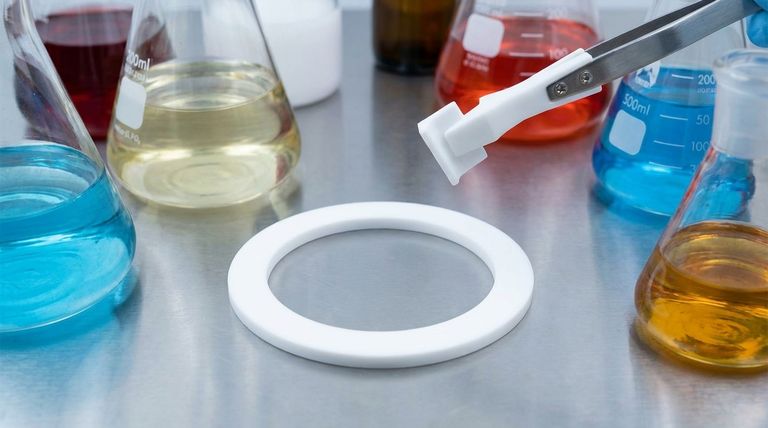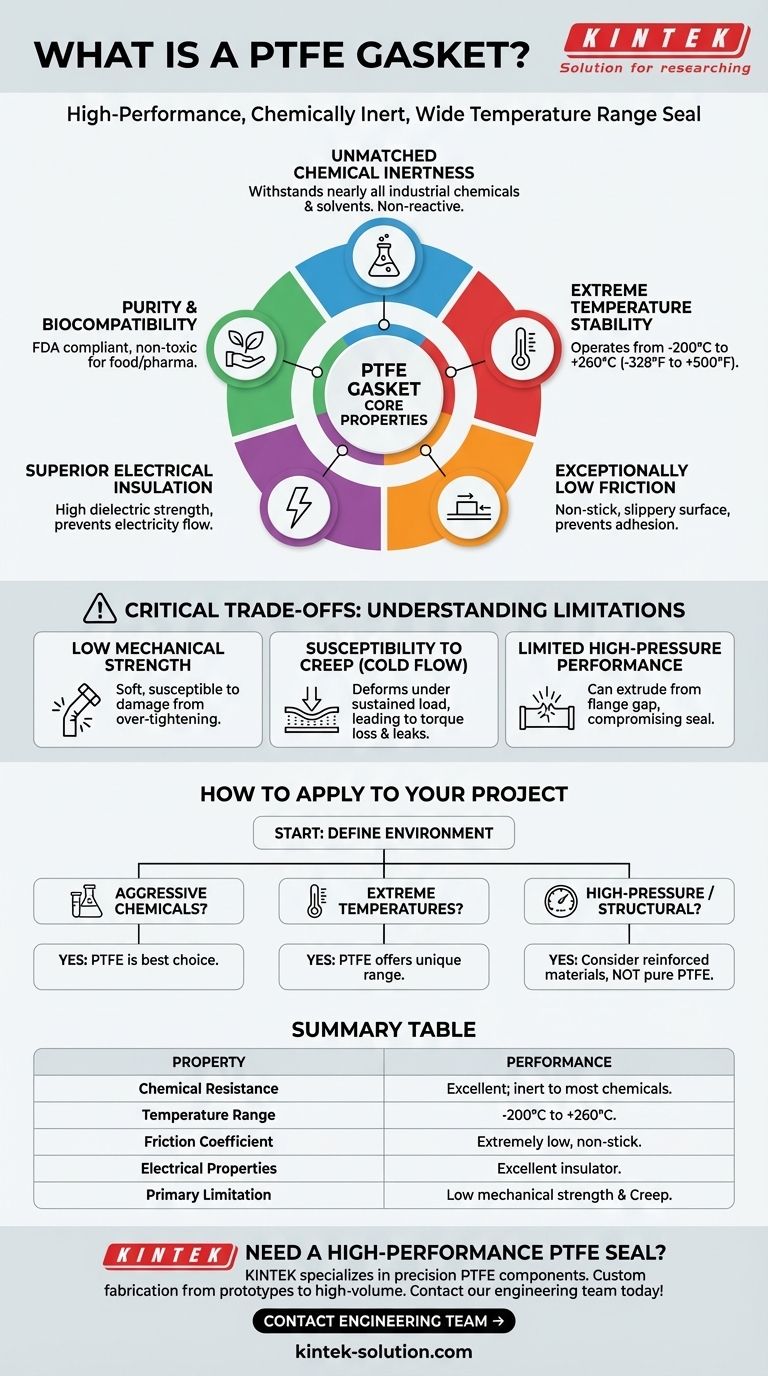In short, a PTFE gasket is a mechanical seal made from Polytetrafluoroethylene, a high-performance synthetic polymer. It is engineered to create a reliable and durable seal between two surfaces, prized for its exceptional resistance to aggressive chemicals, extreme temperatures, and electrical currents.
The core value of a PTFE gasket lies in its unparalleled chemical inertness and wide temperature range. However, this performance comes with a critical trade-off: its low mechanical strength makes it unsuitable for high-pressure, structural applications where material creep is a concern.

The Defining Properties of a PTFE Gasket
To understand where a PTFE gasket excels, we must first look at the unique characteristics of the material itself. These properties make it a default choice in many demanding industrial environments.
Unmatched Chemical Inertness
A key feature of PTFE is its ability to withstand nearly all industrial chemicals, solvents, and corrosive agents. This near-total chemical immunity is due to the strong carbon-fluorine bonds in its molecular structure, making it one of the most non-reactive materials used in sealing.
Extreme Temperature Stability
PTFE gaskets perform reliably across an exceptionally broad temperature spectrum, typically from -200°C to +260°C (-328°F to +500°F). This allows them to maintain their sealing integrity in both cryogenic applications and high-heat processes where other elastomers would quickly fail.
Exceptionally Low Friction
PTFE has one of the lowest coefficients of friction of any solid material, giving it a distinct non-stick, "slippery" surface. This property is beneficial in applications where parts need to move against the gasket or to prevent materials from adhering to the seal.
Superior Electrical Insulation
As an excellent electrical insulator with high dielectric strength, PTFE is highly effective at preventing the flow of electricity. This makes it an ideal gasket material for isolating electronic components or in applications with high radio frequencies.
Purity and Biocompatibility
PTFE is inherently inert, non-toxic, and can be manufactured to meet FDA standards for food contact. This makes it a preferred material for gaskets in the food, beverage, and pharmaceutical industries where purity and non-reactivity are critical.
Understanding the Critical Trade-offs
No material is perfect, and the strengths of PTFE are balanced by specific limitations. Acknowledging these trade-offs is crucial for successful application.
Low Mechanical Strength
The primary drawback of virgin PTFE is its relative softness and low mechanical strength. It lacks the rigidity of metallic gaskets or the resilience of many other polymers, making it susceptible to damage from over-tightening or in structurally demanding roles.
Susceptibility to Creep (Cold Flow)
This is the most critical limitation of PTFE gaskets. Under sustained compressive load—such as the pressure from a bolted flange—the material can slowly deform and "flow" out of the seal area. This phenomenon, known as creep or cold flow, can lead to a loss of bolt torque and, eventually, a leak.
Limited High-Pressure Performance
Because of its softness and tendency to creep, pure PTFE is generally not recommended for very high-pressure systems. The material can be extruded out of the flange gap, compromising the seal. For these applications, filled PTFE (which includes additives like glass or carbon) is often used to improve strength and creep resistance.
How to Apply This to Your Project
Choosing the right gasket material requires matching its properties to the demands of the operating environment.
- If your primary focus is sealing aggressive chemicals: PTFE is arguably the best and most reliable choice available.
- If your primary focus is performance in extreme temperatures: PTFE offers a uniquely wide operating range that few other polymers can match.
- If your primary focus is a high-pressure or structural seal: Pure PTFE is likely unsuitable due to its softness and tendency to creep; you should consider reinforced gasket materials instead.
By understanding both its exceptional resistances and its mechanical limitations, you can confidently deploy a PTFE gasket in applications where it will deliver unparalleled performance.
Summary Table:
| Property | Performance/Characteristic |
|---|---|
| Chemical Resistance | Excellent; inert to nearly all industrial chemicals and solvents |
| Temperature Range | -200°C to +260°C (-328°F to +500°F) |
| Friction Coefficient | Extremely low, non-stick surface |
| Electrical Properties | Excellent electrical insulator |
| Primary Limitation | Low mechanical strength and susceptibility to creep (cold flow) |
Need a High-Performance PTFE Seal for Your Application?
PTFE gaskets are essential for reliability in harsh environments, but choosing the right formulation and design is critical. KINTEK specializes in manufacturing precision PTFE components, including gaskets, seals, liners, and labware.
We serve the semiconductor, medical, laboratory, and industrial sectors, offering custom fabrication from prototypes to high-volume orders. Our expertise ensures you get a seal that delivers superior chemical resistance and temperature stability without compromising on performance.
Let's discuss your specific requirements → Contact our engineering team today!
Visual Guide

Related Products
- Custom PTFE Parts Manufacturer for Teflon Parts and PTFE Tweezers
- Custom PTFE Parts Manufacturer for Teflon Containers and Components
- Custom PTFE Sealing Tapes for Industrial and High Tech Applications
- Customizable PTFE Seals Filter Holders for Versatile Applications
- Custom PTFE Measuring Cylinders for Advanced Scientific and Industrial Applications
People Also Ask
- How does the low friction property of PTFE bushes benefit applications? Extend Component Life and Reduce Maintenance
- What does the machining process for PTFE parts involve? Mastering Precision for Soft, Heat-Sensitive Materials
- Why are ePTFE gaskets suitable for food and pharmaceutical industries? Ensure Product Purity and Compliance
- What are PTFE mill-type envelope gaskets used for? Seal Critical Flanges in Corrosive & High-Purity Systems
- What are the benefits of 15% graphite-filled PTFE bushings? Enhance Wear Resistance & Thermal Performance
- How does PTFE's electrical insulation property benefit electronic components? Ensure Reliability and Signal Integrity
- How does thickness affect PTFE sheet selection? A Guide to Balancing Strength and Flexibility
- How are PTFE Teflon washers utilized in the food processing industry? Ensuring Food Safety and Efficiency



















